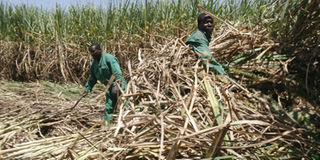Tana Delta locals push for sugarcane project they rejected in 2004

Sugar cane farmers harvest cane in a plantation. Residents of Tana Delta sub-county want the national government to implement a Sh10 billion sugar farming project they previously rejected.
Residents of Tana Delta sub-county want the national government to implement a Sh10 billion sugar farming project they previously rejected.
The project was piloted in October 2004 under President Mwai Kibaki’s government on a 100-acre demonstration farm.
Residents said political interests are to blame for the failure of the project to kick off, undermining livelihoods and the local economy.
“We admit that we failed as people. We were swayed by emotions and leaders but having seen how other counties are benefiting from the projects that the administration allocated to regions, we realise we were silly to side with our politicians,” said Mr Asaf Komora.
Mr Komora, who worked on the demonstration farm, blamed politicians for preaching their ignorance about the project instead of educating the people on its economic value.
The Brazilian sugar variety was found fit for the Delta soil as it had the potential yield of 180 tonnes of sugarcane per acre in 10 months, according to research.
As a result, the Tana and Athi Rivers Development Authority (TARDA) set aside 22,000 hectares of land at the Tana Delta Irrigation Project (TDIP) in Garsen that was capable of producing more than 400,000 tonnes of sugar every year.
But protests from the community and political interference saw investors willing to fund the project abandon the idea, leaving the farm idle.
The land is now a grazing field for migrant livestock during the dry season.
Mr Habil Kanana, a farmer from Garsen village, said the area has no other meaningful economic activities and that if the sugar project is revived, it would be of great economic value to the country alongside existing rice projects.
“Right now, our children are suffering from lack of jobs and some are now engaged in drug consumption and crimes. Lamu is growing, Kilifi the same, while our neighbours Garissa are part of the Lapsset project. If we have this project once again, we will guard it with our lives,” he said.
Mr Kanaba added that unlike previously, when residents claimed that the area was necessary for grazing, climate change has not spared it and herders are going to Lamu to graze.
The farmers also noted that the agricultural projects will set the pace for industrial development and the growth of enterprises and towns.
In 2008, multinational company Mat International declared its interest in investing Sh10 billion in the project but pulled out due to wrangles in the local community, with politicians and environmental activists saying the investment would destroy the area’s ecosystem.
If the government considers the farmers’ proposal, Tana Delta will kick off the planting of sugarcane, which experts say takes 10 months to mature compared with the Western Kenya belt where sugarcane takes 22 months.
The production cost per acre is estimated at below $300 dollars, with sucrose content of over 14 percent.
Tana Delta is deemed suitable for block farming units, with nucleus estates and outgrowers expected to utilise 18,000 hectares to produce 350,000 tonnes of sugar.





